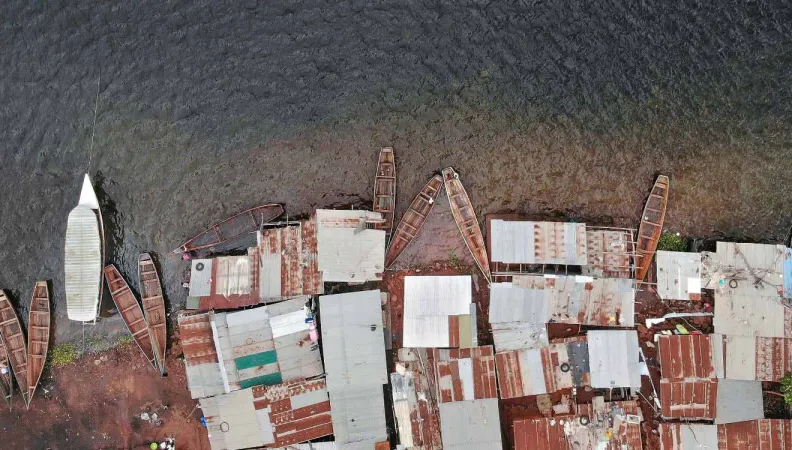 Legal notice EU (project) Climate change and variability in South East Asia (SEA) has been remarkable in the past 20 years. The peculiarity of the economy and societal structure of SEA has an impact on how these effects will be distributed across the population. This project investigated the impact of climate variability on social inequality in Vietnam and Indonesia, with the purpose of informing and influencing policy dialogues and development around issues of climate variability and social inequality.
Legal notice EU (project) Climate change and variability in South East Asia (SEA) has been remarkable in the past 20 years. The peculiarity of the economy and societal structure of SEA has an impact on how these effects will be distributed across the population. This project investigated the impact of climate variability on social inequality in Vietnam and Indonesia, with the purpose of informing and influencing policy dialogues and development around issues of climate variability and social inequality.
Context
Climate change and variability in South East Asia (SEA) has been remarkable in the past 20 years. In this study we focus on Vietnam and Indonesia, two countries that are among the fastest growing lower-middle income countries in the region. They are also among the worst affected by climate extreme in the past decades, ranking 6th and 50th in the Climate Risk Index (2017), respectively. However, their poverty and inequality patterns and trends are remarkably different. Although reducing at a significant pace, poverty in Indonesia persists at much higher rate than in Vietnam (ADB, 2019).
Inequality patterns also differ and have specific country level peculiarities that makes each of these countries an interesting case study. A recent UNESCAP report suggests that, between 1990-2014, despite the similar economic growth, inequality has been increasing steadily in Vietnam and even more in Indonesia. Finally, inequality driving factors are also quite dissimilar, with ethnicity and remoteness, and rural-urban divide and migration, being predominant factors respectively in Vietnam and Indonesia.
This project is part of the first phase of the Research Facility on Inequalities, coordinated by AFD and funded by the European Commission over the 2017-2020 period. The first phase of the Facility has led to the conduct of 22 research projects and the publication of around 100 research papers and policy briefs.
Objective
The main purpose of this study will be two-fold:
- to provide policy makers with a substantial evidence base to target social equity and equality interventions effectively
- and to strategically inform the enforcement of social protection policies that are able to capture the climate-inequality nexus while maintaining a high degree of climate and poverty sensitivity and responsiveness.
The outputs of the project will be tailored to specific national priorities in terms of climate change and inequality via the direct engagement with policy makers and local experts. Advocacy, consultations and capacity building exercises carried out throughout the project will ensure that the research will address relevant evidence gaps to inform the dialogues for climate-inequality-sensitive decision making in Vietnam and Indonesia.
Method
Using a combination of repeated cross section analysis, panel analysis, synthetic panel analysis, we will investigate the relationship between climate variability and inequality at four levels:
- average impact – national level – entire population;
- average impact – national level – entire population by deciles of income distribution;
- impact at sub-national level – population located in hot-spots - vis-à-vis average/national impact (hot spots will be identified using the comprehensive climate data and the unit of analysis defined accordingly);
- impact at sub-national level – most vulnerable groups: ethnic minority, female headed HHs, etc.
Results
The outputs have been:
- One complete research article: Who bears the burden of climate variability? A comparative analysis of the impact of weather conditions on inequality in Vietnam and Indonesia?
- One policy brief in the AFD Policy Brief Series detailing the core contributions to the literature and results of the study: Climate variability and inequality: Comparing the experiences of Indonesia and Vietnam
- Two country policy briefs in the AFD Policy Brief Series detailing for each country the most salient aspects, results and recommendations forward:
- The impact of climate variability on inequality: Evidence from Indonesia
- The impact of climate variability on inequality: Evidence from Vietnam
Two webinars based on the research paper have been organised in the CGIAR Webinar Series. These two events sought to reflect on the impacts that the current climate crisis has on the most vulnerable in Vietnam and Indonesia and to answer the following questions: Is climate variability regressive? Or better does climate variability impacts more on those who are less able to cope with its consequences? And if so, what can we do to ensure an equal, sustainable economic development for all?
- Webinar on Vietnam: watch the replay here
- Webinar on Indonesia: watch the replay here
Contact
- Cecilia Poggi, Research Officer, AFD
- Dr Grazia Pacillo
